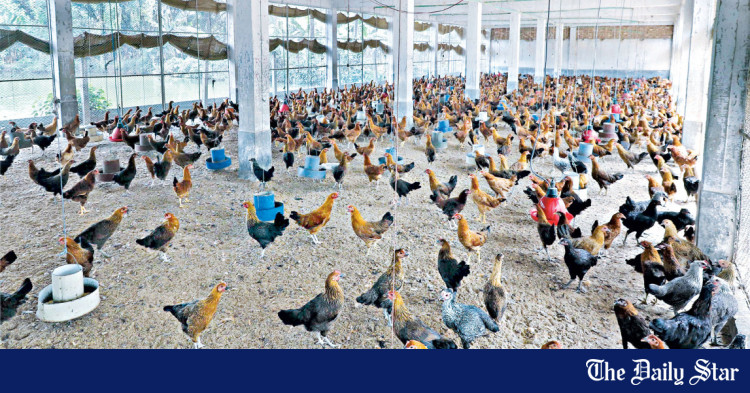Breaking up oligopoly in poultry industry
Atiqul Kabir Tuhin
Published :
Aug 21, 2024 21:58
Updated :
Aug 21, 2024 21:58

At a time when food security is severely under threat, with low and middle-income people forced to cut one essential item after another from their diet due to skyrocketing prices, the fact that a handful of big companies are manipulating the market for exorbitant profits is nothing short of being sinful and criminal.
The commercial poultry industry is a particular case in point, which is firmly in the grip of an oligopoly, with a few large players controlling a significant portion of the market. While the involvement of big farms in poultry, livestock and agriculture sectors is no doubt essential - given their ability to significantly boost production and meet the commercial demand through the adoption of modern methods that small-scale farmers cannot afford- this concentration of market monopolies has major drawbacks. These large farms have frequently been accused of establishing market control that artificially drives up the prices of various essential products.
Recently, Bangladesh Poultry Association (BPA), a platform of marginal farmers, painted a disturbing picture of the country's poultry industry, where a few powerful corporations dominate the market at the expense of both marginal farmers and consumers. The BPA alleged that a few big companies in the sector made an additional profit of Tk 59.20 billion in the last one year through syndication in chicken and egg market.
The BPA stated that due to a syndicate of four to five corporate companies, the prices of feed and day-old chicks have become excessively high in the country, driving up the production costs of chicken and eggs. It noted that in India, the price of feed ranges from Tk 40-50 per kilogram, a day-old chick costs Tk 25-35, the production cost of an egg is Tk 5, and that of broiler chicken is Tk 76-86 per kilogram. In contrast, in Bangladesh, feed costs Tk 60-72 per kilogram, a day-old chick costs Tk 60-100, the production cost of an egg is Tk 10.29, and broiler chicken costs Tk 155-170 per kilogram.
This scenario is particularly alarming because it points to a systematic exploitation of the poultry sector, which is vital for the country's food security and rural economy. Marginal farmers are bearing the brunt of this exploitation, with many being forced to shut down their farms due to continued losses. This has also driven up retail prices, making these essential proteins unaffordable for many households, especially the poor and low-income earners
For millions of Bangladeshi families, egg and broiler chicken are often the last resort to fulfill their essential protein needs due to their relatively lower prices. Unfortunately, this alternative source of animal protein has also become a lot more expensive in the last couple of years, taking a heavy toll on poor and limited income people.
The situation is a double-edged sword. On the one hand, large-scale farms have the potential to enhance productivity, ensure food security, and contribute to economic growth by utilising advanced technology and economies of scale. On the other hand, when these farms dominate the market without adequate regulatory oversight, they can exploit their position to manipulate prices, hold consumers to ransom, prioritise profits over public welfare, and marginalise small-scale producers.
It is crucial, therefore, to strike a balance between encouraging large-scale production and ensuring fair competition. Regulatory bodies must monitor these big farms closely to prevent monopolistic practices and safeguard the interests of consumers and small farmers alike.
Additionally, the import of goods into the country is also largely dominated by a select group of companies. Currently, only certain companies are registered to import products, leading to a lack of competition in the market. This monopolistic environment restricts others from importing goods at perhaps lower prices, which in turn raises the prices.
To foster a competitive and beneficial environment, all types of companies, both small and large, should be allowed to register for importing products. It is also crucial to ensure that these companies can import and market their goods without any undue influence or obstruction. A higher number of importers will create a competitive market, stabilise supply, and ultimately reduce prices that will benefit both consumer and supplier.
According to the Bangladesh Bureau of Statistics (BBS), general inflation reached 11.66 per cent in the first month of the fiscal year 2024-25, a jump from 9.72 percent in the previous month. Worryingly, food inflation was reported at 14.10 percent in July - the highest in nearly a decade and a half.
For the impoverished people, who already spend the lion's share of their income on food just to survive, the situation has reached a critical point. A World Bank survey recently revealed that 71 per cent of people in Bangladesh are grappling with uncertainty about their ability to purchase food.
This dire state of food security is further underscored by another report from the World Food Program (WFP), which highlights that the poor are now spending 58 per cent more on food than they did just two years ago. In 2022, the monthly per capita cost of food for those living below the poverty line was Tk 1,851. This year, the average monthly per capita cost has shot up to Tk 2,923. This sharp rise in the cost of living has forced 68 per cent of the population to drastically cut back on their living expenses and protein intake risking ill health.
The newly formed interim government has an urgent responsibility to investigate unfair practices in the market, hold the manipulators accountable and make essential foods affordable. It must act decisively without delay to curb these abuses, restore fairness to the market, and protect the wellbeing of the nation.
Atiqul Kabir Tuhin
Published :
Aug 21, 2024 21:58
Updated :
Aug 21, 2024 21:58
At a time when food security is severely under threat, with low and middle-income people forced to cut one essential item after another from their diet due to skyrocketing prices, the fact that a handful of big companies are manipulating the market for exorbitant profits is nothing short of being sinful and criminal.
The commercial poultry industry is a particular case in point, which is firmly in the grip of an oligopoly, with a few large players controlling a significant portion of the market. While the involvement of big farms in poultry, livestock and agriculture sectors is no doubt essential - given their ability to significantly boost production and meet the commercial demand through the adoption of modern methods that small-scale farmers cannot afford- this concentration of market monopolies has major drawbacks. These large farms have frequently been accused of establishing market control that artificially drives up the prices of various essential products.
Recently, Bangladesh Poultry Association (BPA), a platform of marginal farmers, painted a disturbing picture of the country's poultry industry, where a few powerful corporations dominate the market at the expense of both marginal farmers and consumers. The BPA alleged that a few big companies in the sector made an additional profit of Tk 59.20 billion in the last one year through syndication in chicken and egg market.
The BPA stated that due to a syndicate of four to five corporate companies, the prices of feed and day-old chicks have become excessively high in the country, driving up the production costs of chicken and eggs. It noted that in India, the price of feed ranges from Tk 40-50 per kilogram, a day-old chick costs Tk 25-35, the production cost of an egg is Tk 5, and that of broiler chicken is Tk 76-86 per kilogram. In contrast, in Bangladesh, feed costs Tk 60-72 per kilogram, a day-old chick costs Tk 60-100, the production cost of an egg is Tk 10.29, and broiler chicken costs Tk 155-170 per kilogram.
This scenario is particularly alarming because it points to a systematic exploitation of the poultry sector, which is vital for the country's food security and rural economy. Marginal farmers are bearing the brunt of this exploitation, with many being forced to shut down their farms due to continued losses. This has also driven up retail prices, making these essential proteins unaffordable for many households, especially the poor and low-income earners
For millions of Bangladeshi families, egg and broiler chicken are often the last resort to fulfill their essential protein needs due to their relatively lower prices. Unfortunately, this alternative source of animal protein has also become a lot more expensive in the last couple of years, taking a heavy toll on poor and limited income people.
The situation is a double-edged sword. On the one hand, large-scale farms have the potential to enhance productivity, ensure food security, and contribute to economic growth by utilising advanced technology and economies of scale. On the other hand, when these farms dominate the market without adequate regulatory oversight, they can exploit their position to manipulate prices, hold consumers to ransom, prioritise profits over public welfare, and marginalise small-scale producers.
It is crucial, therefore, to strike a balance between encouraging large-scale production and ensuring fair competition. Regulatory bodies must monitor these big farms closely to prevent monopolistic practices and safeguard the interests of consumers and small farmers alike.
Additionally, the import of goods into the country is also largely dominated by a select group of companies. Currently, only certain companies are registered to import products, leading to a lack of competition in the market. This monopolistic environment restricts others from importing goods at perhaps lower prices, which in turn raises the prices.
To foster a competitive and beneficial environment, all types of companies, both small and large, should be allowed to register for importing products. It is also crucial to ensure that these companies can import and market their goods without any undue influence or obstruction. A higher number of importers will create a competitive market, stabilise supply, and ultimately reduce prices that will benefit both consumer and supplier.
According to the Bangladesh Bureau of Statistics (BBS), general inflation reached 11.66 per cent in the first month of the fiscal year 2024-25, a jump from 9.72 percent in the previous month. Worryingly, food inflation was reported at 14.10 percent in July - the highest in nearly a decade and a half.
For the impoverished people, who already spend the lion's share of their income on food just to survive, the situation has reached a critical point. A World Bank survey recently revealed that 71 per cent of people in Bangladesh are grappling with uncertainty about their ability to purchase food.
This dire state of food security is further underscored by another report from the World Food Program (WFP), which highlights that the poor are now spending 58 per cent more on food than they did just two years ago. In 2022, the monthly per capita cost of food for those living below the poverty line was Tk 1,851. This year, the average monthly per capita cost has shot up to Tk 2,923. This sharp rise in the cost of living has forced 68 per cent of the population to drastically cut back on their living expenses and protein intake risking ill health.
The newly formed interim government has an urgent responsibility to investigate unfair practices in the market, hold the manipulators accountable and make essential foods affordable. It must act decisively without delay to curb these abuses, restore fairness to the market, and protect the wellbeing of the nation.







































